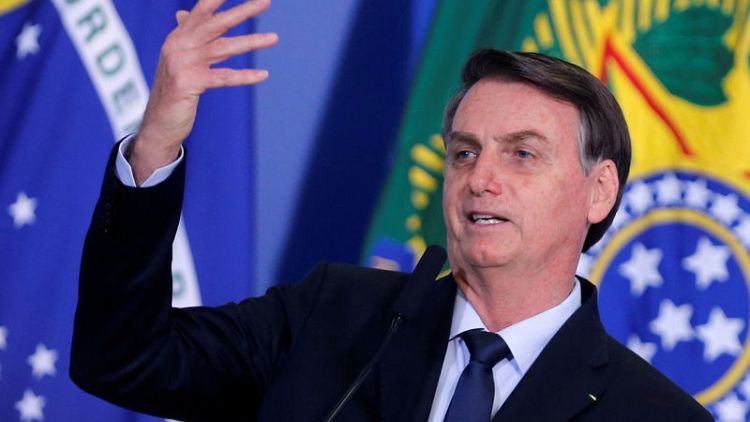By Anthony Boadle and Jamie McGeever
BRASILIA (Reuters) - Brazilian President Jair Bolsonaro will try to build momentum for his government's market-friendly reforms on Tuesday, proposing new measures to tackle a budget deficit that are likely to be met with skepticism among lawmakers.
With a landmark pension reform approved, Bolsonaro plans to accompany Economy Minister Paulo Guedes on a visit to Congress, hoping to defy the backlash against belt-tightening policies in Latin America and a crisis in his own party.
The wide-ranging proposals include reducing tax breaks by 10%, freeing up government funds to pay down public debt, easing budget rules to lower obligatory spending and ending job stability for new civil servants, government officials said.
Guedes will propose a constitutional amendment to allow the government to cut public sector employee salaries, hours and benefits to help it comply with a public spending cap.
Whatever the reception on Tuesday, a noisy split in Bolsonaro's party and his lack of a broader coalition will slow progress on his agenda. The president has threatened in recent weeks to leave his right-wing Liberal Social Party.
Lawmakers say none of the major reforms he proposes will pass this year and there is a tight window next year to pass laws before campaigning starts for local elections in October.
"I don't see anything substantial getting through Congress before the end of the year," said lawmaker Marcelo Ramos, of the Liberal Party, which like other centrist parties broadly sees the reforms as needed to jumpstart an underperforming economy.
Ramos, who chaired the lower house pension reform commission, said spending cuts were unavoidable. However, he said Guedes must take steps to reduce wide social inequalities or Brazil could see rising discontent of the kind that spilled over into street protests in Chile and Ecuador.
Unlike pension reform, which had been debated in Congress for years before Bolsonaro took office, the rest of the Guedes agenda may take time to reach a consensus among lawmakers.
The most ambitious idea is an overhaul of Brazil's Byzantine tax system to simplify and reduce the burden on businesses, but the proposal is so complex that it will probably be well into next year before it gets put to Congress.
Elmar Nascimento, the lower house leader of the government's main ally, the Democrats, told Reuters approval will take time because bills will need to "mature" through debate in Congress.
A planned pact between the federal government with states and local governments is a tough sell in Congress, Ramos said, and a second pension reform bill to include the states is not going anywhere.
"Bolsonaro's ability to muster support for reforms may start to waver," said William Jackson, chief emerging market economist at Capital Economics. He noted that the government's priorities appear to be in constant flux and are behind schedule like the tax reform.
"The upshot is that it looks like many of these reforms will be delayed, diluted or abandoned," Jackson said.
(Reporting by Jamie McGeever, Marcela Ayres, Maria Carolina Marcello and Anthony Boadle; Editing by Brad Haynes and Howard Goller)
